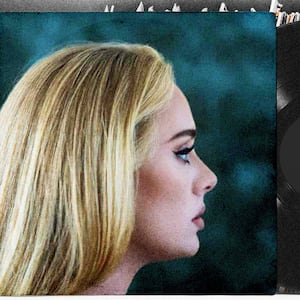Blues and country music have long trodden the swampy borderland between oppressed working-class sensibility and commercial populism. On one hand, the former—which rooted the tree of American music that would one day branch into the dominant genres of the 20th century: rock and roll, rap, and country—emerged directly out of slavery and has a long, storied history of furnishing a soundtrack to underclass struggle. The latter, country music—which was born largely of the blues and shares its heritage for lending a tune to the poor and the persecuted—today fills stadiums. Its biggest, bling-laden names rake in tens and even hundreds of millions of dollars, all while doing their damnedest to assert the blue-collar cred necessary to woo the rank-and-file proletariat. Shoot—my boots might sparkle but I’m just another working stiff like you, and all that.
As she finds herself drawn into the bayou of country industry acclaim, “gothic blues” singer-songwriter Adia Victoria is navigating the quagmire that inevitably churns up amidst the struggle between class-conscious authenticity and the rising tide of personal success. Her latest album, A Southern Gothic, has so far brought her along an eclectic route that has meandered from the stages of Nashville to the cafes of Paris, from an Amazon distribution center to the Billboard Top 10.
I chatted with Adia via Zoom to learn more about her latest album, the recognition it’s brought her, and the struggle to keep it real in the face of success.
I saw somewhere on social media that A Southern Gothic was written while you were working at an Amazon distribution center.
Half the album was written in Paris before the pandemic, and then I came back home from that writing trip about a week before the shutdowns began in New York City. I had gotten a job at Amazon just to have a little extra money in my pocket, and yeah, I found myself working in a warehouse that suddenly became the center of a lot of people’s universe, you know? People couldn’t leave home, so I was packing orders, groceries, and I found that kind of environment really lends itself to the writing process. There’s a rhythm that you keep up for five or 10 hours—if you work a double—and it allows your mind to just kind of float. I found myself really getting into the rhythms of walking over the course of my shift, and then I would get an idea in my mind and run out to my van, much to the chagrin of my managers. I kept my guitar in my van, and I would just write down and try and record as many ideas as I could while in the parking lot at work.
Do you think that experience made it into the lyrics at all?
I think that one of the songs where it is particularly manifest is the song “Carolina Bound.” I was in the middle of a particularly grueling shift—my back hurt, my feet hurt, everything hurt, and there’s this fear, this constant anxiety every time I'd have to go to work and be around other people breathing and whatnot. I had this moment when I stopped, and I was like, what am I doing here in Nashville? What am I doing here in Tennessee? I never intended to be here this long. I want to go back home. And I think that that was a feeling that a lot of people confronted last year. This feeling of wanting to go back to the familiar, to go back to what was safe and known, and for me that was South Carolina, right? Where I was born and raised. And I just wanted to run away. Clock out and just disappear.
A lot of people will be surprised to learn that a bestselling artist like yourself is still forced to work a day job. Is it all just part of the struggling musician ethos?
I think that a lot of that is perpetuated by the artists themselves. We want to see ourselves as, you know, when you make it that you’re no longer an ordinary person; you live completely for your art and you are being supported. And it’s pride, and it’s ego. It’s the same thing that goes into everybody else’s hustle and everybody else’s obsession with maintaining appearances. We live in a very shallow, insecure society where you are only as good as the way you show up. And most people don’t realize the work and the labor that goes into maintaining appearances. But I’ve never been someone who was particularly wooed by appearances because growing up in the church I saw the pound of flesh that was required for going into being a respectable, popular, well-regarded, you know, person. It costs you your soul. And so I thought it was important for people to see that I make art, yes, but this is not my entire identity. I have to eat. I have to pay bills. I go to work and I do this labor that is not tied to my self-being. It doesn’t define me. I go and clock into Amazon, but in the same token, my art does not define me. I’m not “Adia Victoria.” This is something that I’ve been blessed to do, but it’s not who I am.
How has your music changed since your first album?
It’s changed in the ways that I’ve changed as a human being, you know? I started writing that record in 2012, close to a decade ago, and I feel like I’ve become a lot more secure in my attachment to the South, to my culture, to my people, to myself. They say that in a neurotic cycle there’s always the triggering, the tension, and then the release, which allows for the neurotic to kind of untangle itself, and I feel like that first record I was still very much in the neuroses of feeling like I was being prayed and hunted, you know, as a Black Southerner. I was, you know? I wrote that song “Stuck in the South,” my first single, the night that Trayvon Martin was killed. And so it’s reflected in my music that I have become a little bit more confident, a little bit more comfortable with my identity, with myself, so I’m able to tell wider stories that aren’t necessarily mine autobiographically. I’m able to tell my story through the lens of other characters. And I think in order to do that you kind of have to get over yourself in a way. You have to have empathy for yourself and other people. There has to be a curiosity about other folks.
On A Southern Gothic, there isn’t just one perspective. Sometimes it’s told in the first person, sometimes it’s told in second or third, and so I was able to remove myself as the main character, you know, from having main character syndrome, like everyone else is just a cameo. I think that that’s a very powerful thing to do as a Southerner because we are so externally oriented. We’re constantly obsessed with maintaining appearances, with honor and, you know, fitting in and being popular and well-regarded. So it’s like, who goes into deciding if you are meeting that mark? You could feel a certain way about yourself, but other people could perceive you another way. And so I was kind of playing with this idea of appearances and Southern manners and the Southern sense of belonging throughout this record.
Not everyone was thrilled by your analysis of the South when you released “South Gotta Change” in 2020. There was—of course—a lot of reactionary outrage on social media. How does the South gotta change?
I think that the South has to deal with the emotions behind its passions, the emotions behind its traditions, and what’s rooting our behavior—this very pathological neurotic behavior—that repeats itself, that feeds on itself in the South. And I think that the change comes from introspection, self-analysis, looking at, you know, the behaviors beneath the surface of things. And I think that’s something that terrifies the South. Why did we do this? How did this happen on our land? How can we say we stood for one thing while at the same time we have perpetuated behaviors that stand in total opposition to what we claim to be about? But I also think that that’s not just endemic to the South. I think that that implicates the entire American project. How can we claim to stand for certain things and yet our behavior is completely opposite of that? But I write as a Southerner. The South is my original muse, and that’s what I’m interested in. This is the land that I’ve grown up in and grown on and so I’m able to have a more intimate relationship as an artist to this land.
On that note, what are your thoughts on William Faulkner? He’s not only a looming figure in Southern art but was largely responsible for creating the “Southern Gothic” aesthetic as we know it today.
I think that William Faulkner was someone that was in the grip of this neurosis in a way that only a white man of his class could be. In a lot of ways his work is almost a psychohistory of the South, of the white Southern mind. And it’s something that so many white Southerners are afraid to delve into. That’s why they're so reliant upon manners. There’s a saying in the South that we have these manners so we don’t rub each other raw. So Faulkner was someone that was able to go beneath the surface of those manners and figure out why they are so held in high regard. What are they really masking? What are they really hiding? And I feel like I kind of took a Faulkner approach to my experience growing up in the Deep South: a Black girl who was raised in primarily white spaces. What did whiteness do to me? How did it interject into me? How have I eaten the same bitter poison bread? And Faulkner for me was almost like a permission slip that you did not have to take the surface for granted, that you could investigate and interrogate the South’s most sacred symbols. And I could do that as a Black person. I could do that as a Black woman, someone that has stood as the ultimate symbol in the South for so long. What happens when the symbol speaks? And that’s what I did on this record.
The record debuted at No. 8 on Billboard, so people are listening. And there was some Grammy buzz. Do you ever worry that this growing recognition might change you?
I mean, it better not. I’ve always said that the blues is like the original punk music. Punk is questioning power. Does the desire for power have power over you? You know, why do you want power? Why do you want to be conceived of as the winner? What is that feeding in you? What food is this? I’ve never been someone that cared about awards or recognition.
Like a few years ago, I won a Buddy Holly award from the Songwriters Hall of Fame. I flew up to New York and then my A&R guy from Atlantic who’s like my stage manager dad—he’s always wanting me to sparkle and stuff—he took me to the ceremony and he took me out to dinner and they gave me the little award and I left the award at the restaurant. And he was like, “Adia, where’s your plaque?” I was like, “I think I left it at our table.” So he like runs back and gets it, brings it to me. I go to my hotel later that night and then the next day when I fly back to Nashville, I was like, “Oh, I left my award in the hotel.” That’s kind of a perfect embodiment of who I am as a person with like pride and shit. It’s like, cool, thanks, but I don’t need it.
I mean, it’s cool, I guess. It always feels nice to know that your peers see you. That’s nice. But I don’t know, it’s kind of freaky. I still consider myself this little ghost that walks around Nashville. I’ll be damned if people think that now because the Grammys know who I am I’m supposed to be, like, a different kind of artist or more serious artist. I’m still the girl on the bus. It’s nice, you know, you can dip your toe into it and then you got to walk away. You can’t feed on it for too long. Because it’s just candy.

Adia Victoria performs onstage during day 2 of the 2019 Pilgrimage Music & Cultural Festival on September 22, 2019, in Franklin, Tennessee.
Terry Wyatt/GettyIt really is.
I still have to have that balance. I still have to be able to walk away from it. I never want to feel like I’m being eaten by something. I’m constantly trying to remind myself who I am apart from what people think I am or what they need me to be. And I think that that’s an exercise and a practice that’s not given much currency in our culture because people want to be human brands, right? Like you want to capitalize on everything that you do. Like your every waking moment we believe should be monetized, and I don’t want to feel that way about my art. It’s like, yeah, it’d be great to not have to work or worry about money, but there’s a freedom that comes from having that distinction of not having that level of success, like I’m still able to maintain my identity separate from whatever people think I am and social media and all that bullshit. I just… ugh. It all comes back to remind me of growing up in the church where people were like, ‘God’s always watching! God’s always looking at you!’ And it’s like now we’ve all become gods that are always like surveilling each other, and I just hate it. I can’t stand it.
You seem to have a highly politicized view of your music.
I think that all music is political, you know? A Taylor Swift song is political. If it’s maintaining the status quo, it’s not objective. It’s not neutral. There is no Switzerland here. If your music is a reflection of the status quo, that is politics. Country music—mainstream bro-country—is extremely political. And I think that when I’m talking about how blues is like punk music, I see punk as a peculiar kind of freedom because you have nothing to lose. Nobody paid the people that were the originators of the blues, you know, right after slavery. They had nothing to lose as far as the world was concerned. All they had was their life. All they had was their soul and their perspective. When you’re in that position you’re kind of incorruptible if you allow yourself to be. But the moment you start wanting or needing that approval of the world, that kind of love and acceptance, it becomes harder for you to speak of that world because that world has paid you. I want to remain a person who does not want that approval or need that approval. I’m good with myself. I made a deal with myself when I signed my deal with Atlantic that the moment that I felt compromised, I would disappear. I would walk away. I would break the contract. I still was in ownership of myself and no contract—no amount of money—was going to change that. So that’s how I walked into this industry, and that’s how I hope to leave it.


